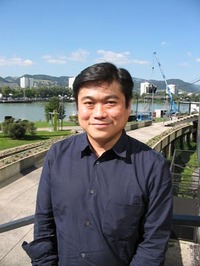Sometimes an answer leaps off the page at you and you have to state it, even when you know it’s impossible.
Joichi Ito should be Japan’s Prime Minister. He should at least make the run. Or fund someone to run in his place.
In a commentary on his home country published in today’s New York Times, Joi explains his nation’s post-war history, explains what’s wrong with the politics there, and does it all in a way even a gaijin (foreigner) can understand. He even explains some Japanese political terms in ways that made me fall in love with the place all over again.
Thanks to American anti-communism, Japan is stuck with a political elite, and a system, based on heavy industry, on deference, and on pork-barrel log-rolling. With the country’s baby-boomer generation now preparing to retire, its leadership choices are stark.
The problem is that to get ahead in politics, everyone is supposed to start at the bottom, which is a boring, awful place to be:
I’ve rejected entreaties by both parties to run for office and have no
regrets; according to my friends in junior positions in the Liberal
Democratic Party, their first years have been spent in minor working
groups, never being allowed to speak up at or attend any meetings of
importance.
"Maybe it’s time for a revolution," he concludes, and he’s absolutely right. The structure of modern Japanese governance was set by the U.S. The system is corrupt. The future looks bleak.
But revolutions don’t have to be violent. They don’t even have to
win to have an impact. America’s recent history provides two good examples.
The George Wallace revolution of 1968 resulted
in a generation of Republican conservative dominance. The H. Ross Perot
(left) revolution of 1992 gave us the presidency of Bill Clinton. These are
not small things.
Japan is a heavily-wired nation, and while a Wired Party would be
unlikely to win, it could get enough votes to become the balance of
power between the two larger parties, the Democratic Party of Japan and
the Liberal Democrats (both parties are the fruit of the same LDP
tree).
A Web-based campaign which ignored the normal ways of doing business
might appeal to younger workers, it would not be hard to put together,
and its candidate list could be produced in an open, Web 2.0 manner.
The job of heading this party’s ticket would not be a lifetime
commitment, either. Perot didn’t win and went back to Perot Systems.
Wallace went back to Alabama politics. No reason why Joi couldn’t ride
right back into the VC world after, maybe, a year.
Yes, it’s attractive to fly around the world, to sip wine in
California, and to gaze at your home from afar, in a clear-headed way.
The idea of a "fly-in" for power, and for political change, sounds
fantastic, ridiculous, outrageous.
But why not give it some thought?












